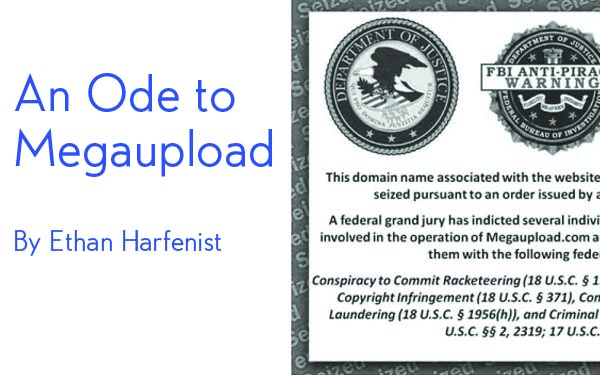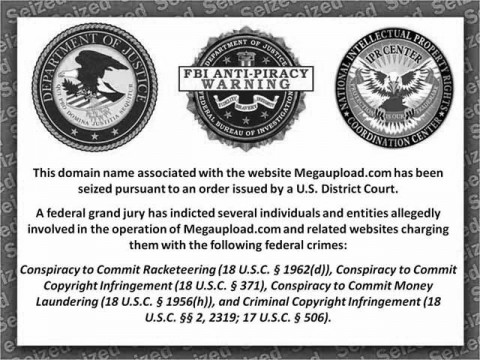Although the United States condemns the state-sponsored Internet censorship that runs rampant in countries such as China and Syria, we are slowly moving in that same direction. On January 20th, the Justice Department and the Federal Bureau of Investigation shutdown the beloved Megaupload, a “locker” website that allowed its users to make sizable file-transfers anonymously. Megaupload was apparently the bane of the entertainment industry’s existence, purportedly losing media companies $500 million, while the website profited $175 million off of advertisements and paid subscriptions to use the file sharing service.
Megaupload had perfectly legitimate uses. Many subscribers relied on the website to store and transfer their own content; not everybody who utilized the site was illegally transferring copyrighted material or uploading movies and albums. Regardless, the website is being charged with “copyright infringement and money-laundering on a massive scale.” Seven individuals connected with Megaupload have been indicted, including Kim Dotcom, the so-called “Dr. Evil” of the whole operation.
Megaupload is not the only website promoting piracy and the transferring of movies and music— the Internet is rife with websites that function almost identically to Megaupload. MediaFire and Rapidshare are the first that come to mind. By shutting down Megaupload, the government seems only to be encouraging the creation of newer, sleeker websites that perform the same services. I am reminded of when Oink—a popular, invite-only torrent sharing site—was taken down. The destruction of Oink spawned the creation of two almost-identical sites: Waffles and What. The only difference was that Waffles and What were better protected and more secretive. Shutting down Oink hardly solved anything, as What and Waffles are still around and thriving to this day.
Was shutting down Megaupload meant to put a significant dent in Internet piracy? According to Reuters, “just 3% of Internet users relied on digital lockers like Megaupload…compared with 9% who used peer-to-peer networks…” It seems as if the destruction of Megaupload will only influence people to flock to websites like PirateBay and BitTorrent to get their illegal-downloading fix. Although these peer-to-peer networks are the tiniest bit more complex to operate than sites like Megaupload and MediaFire, people will not balk in the face of one miniscule hurdle for free entertainment.
The demise of Megaupload is deeply unsettling. Although the American public and countless websites (most notably Wikipedia and Reddit) demonstrated their utter disdain for any significant government interference in Internet affairs, the government still managed to overstep its boundaries and eliminate a website that millions of people relied on for legitimate digital storage. Megaupload wasn’t just a haven for piracy and copyright infringement; it was a locker for anything from resumes to dissertations, from home movies to volumes of original work. Now that the United States has erased Megaupload, it has also erased millions of invaluable files for its unsuspecting users.
Even though SOPA and PIPA have been defeated (at least temporarily), are we safe from government censorship of the Internet? Or are we well on our way to becoming more like the repressive regimes of Syria and China? As self-proclaimed defenders of the free world, we should not be mimicking injustices by states that typify tyranny and repression. Instead, we should lead by example and allow the Internet to function free from censorship like it has been since its inception in our nation. A free Internet represents a commitment to innovation, a commitment to liberty and a commitment to the ideals that makes America great. The death of Megaupload may pave the way for increased government intervention in previously private realms. It is crucial for us, as Internet users and Americans, to not stand idly by as our government infringes on our rights as citizens. After all, our government is meant to serve us, not to control us. •











